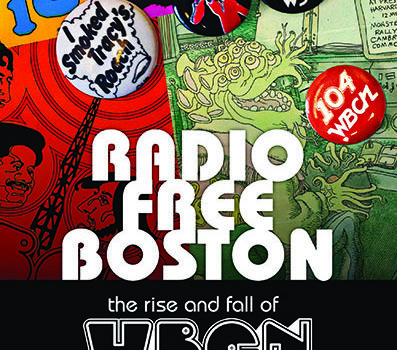 Radio Free Boston: The Rise and Fall of WBCN; Carter Alan (with foreword by Steven Tyler); Northeastern University Press; 2013; $25.95 Paperback; $19.99 Ebook
Radio Free Boston: The Rise and Fall of WBCN; Carter Alan (with foreword by Steven Tyler); Northeastern University Press; 2013; $25.95 Paperback; $19.99 Ebook
Love it or hate it, modern radio entertainment is a child or at least a stepchild of Boston-based radio station WBCN when it was in its hippest prime, from the late 1960s and well into the 1990s.
Running through this fascinating and well-written slice of pop-culture history are the influences that helped spawn WBCN—many of them rooted in the academic world of Greater Boston in the persons of young, creative college DJs.
Originally created as a classically focused FM station by radio pioneer Mitchell Hastings as part of an east coast network (the CN in the call sign stood for “classical network”), by the late 1960s, changing markets and the increased challenges of sustaining a classical format with advertising revenues helped the founder to accept a radical shift of formats proposed by a local music entrepreneur, Ray Riepen.
The individuals that turned a failing classical station into a cultural institution that dominated the youth scene for decades, in turn, often hailed from area college radio stations, and brought with them an iconoclastic approach and at best only a grudging tolerance for advertisers.
The story of WBCN, told by a long-time on-air personality, Carter Alan–who joined the enterprise in the 1970s, is replete with colorful, sometimes nearly undeliverable stories of excess, on-air chutzpah, and prescient playlists that proved to be influential far beyond the home of the bean and the cod.
From its inception, the station and its various dominating personalities chose to rewrite the playbook, embracing not only cutting-edge popular and rock music but, on occasion, classical music, chats with political figures, and all manner of on-air zaniness—including daily astrological forecasts to complement traditional news and weather and lost dog and cat report.
An indicator of the station’s power and persona came in 1979 with the WBCN radio strike. New owners, attracted by the property’s high listenership and strong revenues, decided to “improve” the station by streamlining operations and adding new management. That meant the unceremonious firings of several publicly visible people as well as numerous support staff. Armed with a missionary zeal and deep loyalty from listeners and advertisers, the entire staff organized a boycott of the station by advertisers and a strike by most remaining employees, both of which eventually caused the new management to retreat.
Many pop acts, ignored elsewhere, got their first big breaks on WBCN, among them, Irish rock band U2. And, in one of history’s “might have beens,” Boston University student Howard Stern, intent on making a name in radio, and attracted by the irreverence often found on WBCN, knocked on the door looking for a job. Unfortunately, for better or worse according to the author, it was simply the wrong day—with no one available to hear out the future “shock jock.”
Despite his close involvement with the story, Alan manages to deliver a readable, entertaining, and dispassionate chronicle. Radio Free Boston puts the commercial and cultural impact of one radio station into context with the historical and social currents of the times–including the sometimes unheralded influences that academic institutions have on the world around them.
In the case of WBCN, there were links to tastemakers and talents nurtured at the Harvard and MIT radio stations, where new music and new kinds of music first began to percolate on to the airwaves. Similarly, the station’s pioneering public affairs programming were nurtured by collegiate sensibilities and by a national alternative media conferences held at Goddard College in Vermont. Most of all, though, WBCN showcased and profited from a rising demographic of more educated and more internationally focused young people. Before there were yuppies there were the radio listeners of WBCN. These were the listeners that the academic institutions of the region helped to create.
Alan R. Earls is a Boston-area writer focusing on business and regional history.
[ssba]
